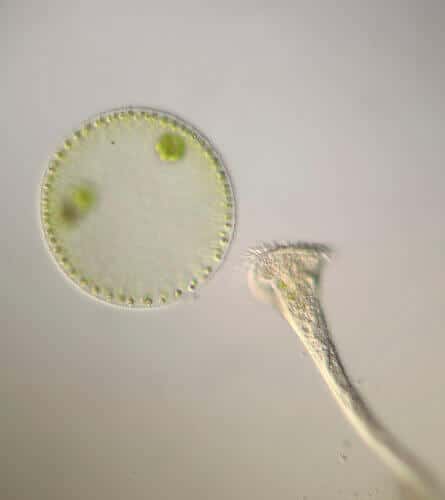A study by researchers at Ben Gurion University shows that it is possible to increase the photosynthetic efficiency 3 to 10 times at light intensities similar to the sunlight used in conventional growing facilities.

Unicellular algae are the smallest "machines" in nature that carry out photosynthesis. These tiny algae, also known as microalgae, are a few micrometers in size and utilize visible light to produce biomass with a much higher efficiency than higher plants.
As an "expertise" in the efficient utilization of the energy stored in the light that strikes them, unicellular algae have great potential in many fields as an alternative to create biofuels, medicines, in the food and cosmetics industry.
However, conventional large-scale algae growth reactors, operating in sunlight, lose most of the sun's energy that hits them. They use only about 10% of the incoming photons. For decades, laboratories in universities and industry around the world have been working to improve the low efficiency of the reactors.
A breakthrough in the field, recently published iniScience (Cell Press), shows that increasing the photosynthetic efficiency 3-fold to 10-fold at light intensities similar to the intensity of sunlight, used in conventional growing facilities, is possible. This is the result of the research work of retired professors Yair Zermi and Jeff Gordon from the Department of Solar Energy and Environmental Physics named after Alexander Yarsin at Ben-Gurion University of the Negev, in collaboration with colleagues from the Algal Biofuel Division of the giant Indian company, Reliance Industries Ltd. The findings open the door to obtaining much higher yields than are currently accepted.
The main idea was that it is possible to bring about a significant increase in the photosynthetic efficiency of algae through the sophisticated use ofPulses of light, which enables synchronization between the time scales of the biological processes (in the range of a few milliseconds) and the photon arrival rate. The article presents several experimental evidences accompanied by a biophysical model that explains the results of the experiments and provides guidelines for further increasing the photocytic efficiency, for example through genetic engineering.
The advances in basic, laboratory-scale proof-of-concept research, as presented in the groundbreaking study, offer extraordinary possibilities in the fields of solar fuels and algae biotechnology. Translating the research results to large commercial algae breeding facilities is a challenge for the future that will require engineering creativity in the fields of optical engineering, mechanical engineering and hydrodynamics.

3 תגובות
to the gatekeeper. Fuel is a feature. Absolutely not a whole, so the word fuels refers to a set of materials with the property of "burning" in purple. Therefore, fuels are a set of materials that have the property of combustion. But what is so important? The important thing is the content of the article which points to an incredible potential for creating energy.
Wow, I'm less bothered by fuel and fuel. It bothers me that the article doesn't say anything except for a title that links algae to increasing the efficiency of photosynthesis. And in the middle one word that hints at what the passage is about - pulses (or pulses, if the gatekeeper comments on a complex).
For many years, my recurring comment is that on the science website, everything is so loved and important, the content does not receive a stage and there is only a focus on the title. Write even a paragraph. something. Link.
What does anyone who reads here learn? There are those who deal with algae and pulses for some reason have increased the efficiency of assimilation with the help of light. We thirst for depth
Is it really that hard for writers?
(and the editor) internalize the fact that
In Hebrew there is no inflection of plurals. ?
Again and again in many, important and good articles
The word "fuels" repeats...
Please learn and understand that fuel is a whole
of ingredients therefore "fuels" Yuk!